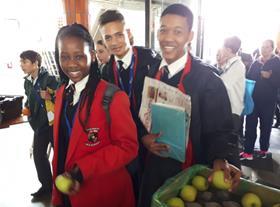
With the western parts of South Africa in the grip of a drought, and severe water shortages hitting the population, measures for optimising water use in the fruit and table grape industries remain top of the agenda.
During the course of the year both the deciduous and table grape sectors have initiated workshops encouraging new production practices which will result in further water savings.
Many initiatives undertaken by individual grower groups are likely to bring major changes in future.
Recent rains over the area have brought some relief, but it is debatable whether it will improve the level of water stored in dams. It will however bring relief to farmers who will not have to irrigate for a few days.
The desperate situation in the region is illustrated by the fact that D-day, which is the day the household and business supply in Cape Town will be turned off, is set for early May next year.
That is if very good rains which will boost the dams substantially do not occur before then, and at that stage citizens will only be allowed to collect 25 litres per day from central collection points.
These urban areas compete with agriculture for the regions water resources.
One initiative held in Cape Town recently and supported by the fruit industry, encouraged the next generation of scientists as they dealt with important scenarios around drought relief and renewable energy.
Tru-Cape supported the event arranged by the national electricity supplier, Eskom, by donating apples to the aspiring young scientists.
According to Tru-Cape, projects highlighted the search for answers on which grey-water is best for plant growth, which is the more effective in producing sustainable energy between wind and solar, and how soil absorbency could be increased.
Many projects also dealt with an essential subject for ongoing food security in our country - the impact of drought - such as the conservation of water, as well as techniques for preventing evaporation and water wastage.
Tru-Cape’s marketing director, Conrad Fick, said the company’s support for the event was in-line with its commitment to support information sharing and quality scientific education, which also forms part of their education outreach programme.






No comments yet